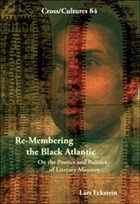The Atlantic slave trade continues to haunt the cultural memories of Africa, Europe and the Americas. There is a prevailing desire to forget: While victims of the African diaspora tried to flee the sites of trauma, enlightened Westerners preferred to be oblivious to the discomforting complicity between their enlightenment and chattel slavery. Recently, however, fiction writers have ventured to 're-member' the Black Atlantic.
This book is concerned with how literature performs as memory. It sets out to chart systematically the ways in which literature and memory intersect, and offers readings of three seminal Black Atlantic novels. Each reading illustrates a particular poetic strategy of accessing the past and presents a distinct political outlook on memory. Novelists may choose to write back to texts, images or music: Caryl Phillips's Cambridge brings together numerous fragments of slave narratives, travelogues and histories to shape a brilliant montage of long-forgotten texts. David Dabydeen's A Harlot's Progress approaches slavery through the gateway of paintings by William Hogarth, Sir Joshua Reynolds and J.M.W. Turner. Toni Morrison's Beloved, finally, is steeped in black music, from spirituals and blues to the art of John Coltrane. Beyond differences in poetic strategy, moreover, the novels paradigmatically reveal distinct ideologies: their politics of memory variously promote an encompassing transcultural sense of responsibility, an aestheticist 'creative amnesia', and the need to preserve a collective 'black' identity.
Table of contents:
Illustrations
Introduction
PART I
LITERARY MEMORY
1 Towards a Poetics of Mnemonic Strategy in Narrative Texts
Testimonies: recourse to mental mnemonic resources
Interlude: the testimony of Olaudah Equiano
Palimpsests: recourse to manifest mnemonic resources
PART II
MNEMONIC FICTIONS OF THE BLACK ATLANTIC
2 Caryl Phillips, Cambridge
The poetics of memory: the art of montage
The politics of memory: empowering culture
3 David Dabydeen, A Harlot's Progress
The poetics of memory: the art of ekphrasis
The politics of memory: empowering the individual
4 Toni Morrison, Beloved
The poetics of memory: the art of musicalization
The politics of memory: empowering the collective
Conclusion
Appendix: Source Passages Adapted in Cambridge
Bibliography
Acknowledgements
This book is concerned with how literature performs as memory. It sets out to chart systematically the ways in which literature and memory intersect, and offers readings of three seminal Black Atlantic novels. Each reading illustrates a particular poetic strategy of accessing the past and presents a distinct political outlook on memory. Novelists may choose to write back to texts, images or music: Caryl Phillips's Cambridge brings together numerous fragments of slave narratives, travelogues and histories to shape a brilliant montage of long-forgotten texts. David Dabydeen's A Harlot's Progress approaches slavery through the gateway of paintings by William Hogarth, Sir Joshua Reynolds and J.M.W. Turner. Toni Morrison's Beloved, finally, is steeped in black music, from spirituals and blues to the art of John Coltrane. Beyond differences in poetic strategy, moreover, the novels paradigmatically reveal distinct ideologies: their politics of memory variously promote an encompassing transcultural sense of responsibility, an aestheticist 'creative amnesia', and the need to preserve a collective 'black' identity.
Table of contents:
Illustrations
Introduction
PART I
LITERARY MEMORY
1 Towards a Poetics of Mnemonic Strategy in Narrative Texts
Testimonies: recourse to mental mnemonic resources
Interlude: the testimony of Olaudah Equiano
Palimpsests: recourse to manifest mnemonic resources
PART II
MNEMONIC FICTIONS OF THE BLACK ATLANTIC
2 Caryl Phillips, Cambridge
The poetics of memory: the art of montage
The politics of memory: empowering culture
3 David Dabydeen, A Harlot's Progress
The poetics of memory: the art of ekphrasis
The politics of memory: empowering the individual
4 Toni Morrison, Beloved
The poetics of memory: the art of musicalization
The politics of memory: empowering the collective
Conclusion
Appendix: Source Passages Adapted in Cambridge
Bibliography
Acknowledgements

